
Tons of thermal coal are unloaded and transported at a port in Lianyungang, East China's Jiangsu Province on December 21, 2022. Photo: VCG
A Chinese steel firm has resumed to purchase Australian coal products, with the first shipment of about 72,000 tons of coking coal expected to arrive at Zhanjiang Port, South China's Guangdong Province on February 8, industry insiders told the Global Times.
The resumption comes amid restored enthusiasm and attention among Chinese companies toward Australian goods thanks to wide expectations for an improvement in bilateral ties. It's also part of a diversification effort to reduce China's reliance on any single source, experts said.
The first shipment of Australian coking coal of 71,682 tons sailed from Australia's HPCT wharf on January 24 and headed to the port at Zhanjiang, Wang Guoqing, research director at the Beijing Lange Steel Information Research Center, told the Global Times on Tuesday.
Zhanjiang Yuexi International Shipping Agency Co, which is responsible for the delivery, confirmed this information to the Global Times on Tuesday.
The coking coal will be delivered to a facility of Baoshan Iron & Steel Co (Baosteel) in Zhanjiang, insiders said.
The resumption of coal trade comes amid broad expectations for improved bilateral ties after frequent high-level meetings and talks. China-Australia relations sank to the lowest ebb in decades because of the hostile stance toward China adopted by the previous Australian government.
Chinese companies that suspended coal trade with Australia are now turning their attention back to Australia, with the resumption of coal trade a real-life example, an industry insider told the Global Times on Tuesday.
These companies are looking to further diversify their sources of supplies to balance the risks and costs.
An employee of Baosteel told the Global Times on Tuesday that the company is diversifying its domestic and foreign coal sources, while taking cost and quality controls as comprehensive considerations in striving for an optimal ratio on the supply side.
"We are continuing to pay attention to the procurement of Australian coal," the person said.
Like many other domestic steelmakers, Baosteel has been optimizing the supply-side structure, with imported coal accounting for less than 10 percent of total consumption.
The Australian coal imports may help reduce coal transportation costs at the company's Zhanjiang production base, but domestic coal and Mongolian coal, the major sources of the supplies should be enough to meet their current market needs, the Global Times learned from another employee of Baosteel.
In 2022, China imported 63.838 million tons of coking coal, with Mongolia accounting for 40 percent of the total at 25.61 million tons, followed by Russia with 33 percent and Canada with 12.34 percent, Mysteel data showed.
The shipment from Australia is small, and it will take time for more Chinese companies to regain confidence in the Australian side, an industry insider said, noting that China Huaneng Group Co and Zhejiang Provincial Energy Group Co, the two major domestic consumers of coking coal, have so far made no moves on Australian coal imports.
With the downgraded epidemic prevention and control policies, China's demand for coking coal is expected to rise in 2023, said experts, adding that there's scope for growth in both domestic origin coal and imports.
"There should be more coal coming to China in the rest of the year from sources such as Australia, particularly in March, as demand was unleashed after steel plants resumed production after the Spring Festival holidays," Wang said.
But it is still too early to tell how much Australian coal will be imported this year. That depends on many factors including imports by other countries and domestic steelmakers' preferences, experts said.




